QuestionI rescued three mice. Two are female and one is male so predictably they were both pregnant. I separated out the male because I don't want to breed more mice - but I think I've ruined his life. He is incredibly skittish (hides when I enter the room) so there is no chance of him getting mental stimulation from humans. I know that he probably won't accept another male - so I'd like to put him back with his sisters. That would mean neutering him. I talked to one vet who seemed to think neutering was too much of a risk.
My questions are:
1 - Does he have a chance at a fulfilling life if I don't neuter him? How might this happen?
2 - How risky is neutering? What should I look for in a vet? I'm willing to go vet shopping if you think I could reduce the risk. Is there special equipment some have? The mouse weighed in at 36 grams at his vet appointment.
3 - Can the baby mouse boys stay together? Some sources say male siblings are OK, others say they may suddenly turn on each other and kill each other so they should be separated pre-emptively.
4 - There isn't a way to introduce the father to a male-friend is there? One of his babies? (I'm assuming that since he has been separated from them already that won't work either.)
5 - Do you have any special advice on care for the babies? I know this question could lead to a small book, I have done a lot of googling and bought a book - but if you think there is something most people do wrong, let me know!
Thank you so much!
AnswerDear Allie,
thank you for your question.
1. Male fancy mice are a problem because they won't accept other males. In some very rare cases two males from the same litter will live together, but I wouldn't risk it. Introducing males to each other that are unfamiliar with each other doesn't work and even males that have grown up together and were separated won't accept each other again.
Sometimes natal rats (multimammate mice) or captivity bred deer mice/White-footed mice are introduced to male mice. They will live together and it's better than no company at all, as long as there are at least two mice of the other species. But it's not the same as company from the same species. A human can't replace another mouse, he will be alone for the majority if the time and it can cause severe behavioural problems.
2. If you can find a vet who has some experience with rodents, then neutering is absolutely possible. It's still an operation, so there is some risk involved, but in my opinion taking the risk that the mouse may die is better than leaving it alone for the rest of its life. Try to find a vet who offers gaseous anaesthesia. The dosage needed is much smaller and easier to control than with injection anaesthesia. 36 grams is a good weight, the rule of thumb is 30 grams and three months, although the weight is more important than the age. Here are some websites that list rodent vets, maybe you can find one who does have prior experience with neutering mice:
http://www.rmca.org/Resources/vets.htm/
http://www.ratforum.com/index.php?topic=21099.0
http://gerbilforum.proboards.com/index.cgi?board=vet
http://www.gerbils.pwp.blueyonder.co.uk/gerbils/vets.htm
http://www.ratfanclub.org/vetref.html
The vet should at least be comfortable with handling the mice, some experience with operations on tumors and such would be great if you can't find a vet who has neutered rodents before. A vet who has neutered rats for example should be able to neuter mice as well. The success rate for operations in general should be at least 90%, better 95%.
A good (trick) question to ask is if you need to bring the mouse in sober for the operation (that is, stop feeding it). If the vet says yes, then he is not experienced with mice. Rodents can't throw up and should never be without food for any length of time.
3. The baby males can stay together for some time, but eventually they will need to be neutered as well. Usually, they start fighting when they are about three months old. The more room they have and the more furniture, the more they fight for territory. Even if they don't hurt each other (and eventually they will), the stress can be enough for some animals to die of. If I have a group of young males that are not yet ready to be neutered, I usually keep them in a small cage that is pretty bare and I take out the house and hiding places at the first sign of trouble, offering a pile of hay for them to hide in works better. Right after they have been neutered, you often see an increase in aggression, but after two weeks or so, they calm down. After that, neutered males are usually the friendliest mice you can imagine. And they don't smell any more or at least only as much as females do.
4. The adult male won't accept another adult. You may be able to introduce him to the male babies by the time they are old enough to live alone (28 days), but once they grow older, he will fight them. If you plan to neuter them all, I would actually recommend introducing him to the male babies. That way, they have an adult they can learn important behaviour from even after leaving their mother. It's probably better if the adult male is already neutered when you introduce them, though.
5. The most important thing is to leave the mothers alone for the first three weeks or so until the babies come out by themselves and are not carried back into the nest immediately. Offer extra animal protein while the females are pregnant and nursing (mealworms, crickets, silkworms - dead/dried or alive are most natural, but can be replaced by high quality dog food if you absolutely don't feel comfortable with feeding them insects). Offer plenty of nesting material and don't clean out the cage until the babies are four weeks old. Cleaning out the toilet corner is fine, though. If you have to check on the nest, use a stick or spoon so that it won't have your smell, rubbing your hand and the stick down with bedding from the cage is also a good idea. At 28 days, the males are able to mate with their sisters and mother, so they need to be separated then. They will be very skittish at that age and may just jump off your hands, but they will calm down once they get older.
Introducing neutered males to females is usually not a problem. You need to wait three weeks (some vets even recommend six) after they have been neutered because there is a small chance that they can still mate during that time. Introducing them to other neutered males can be more difficult. If all the males are freshly neutered, they may still regard each other as full males and fight. That behaviour will stop after two or three months, though, and then it's just as easy as introducing them to females. There are exceptions of course, I have successfully introduced freshly neutered males (especially if they had been alone for a while, they were so happy about the company).
Here's a website on male mice, neutering and guides to introducing them:
http://das-maeuseasyl.de/doku.php/en/behavior/male_mice
(there are some graphic photos of mice seriously hurt and killed by other males)
The species guide on the left has more good info on fancy mice in general as well.
I hope I was of some help to you
Jennifer

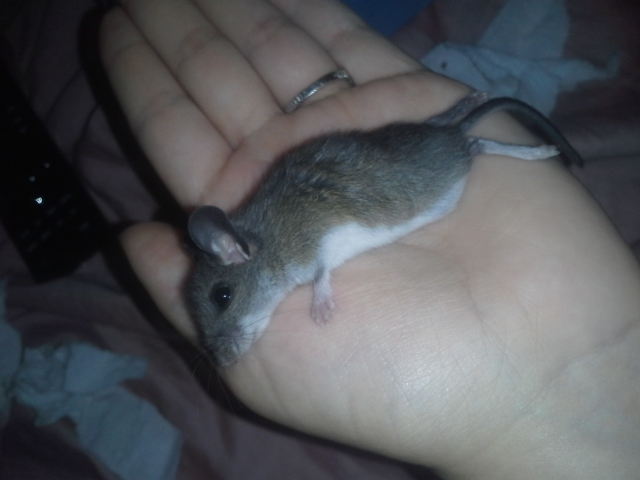 cat brought in injured wild mouse
Question
mouse
Hi,
My name is Alexandria and to
cat brought in injured wild mouse
Question
mouse
Hi,
My name is Alexandria and to
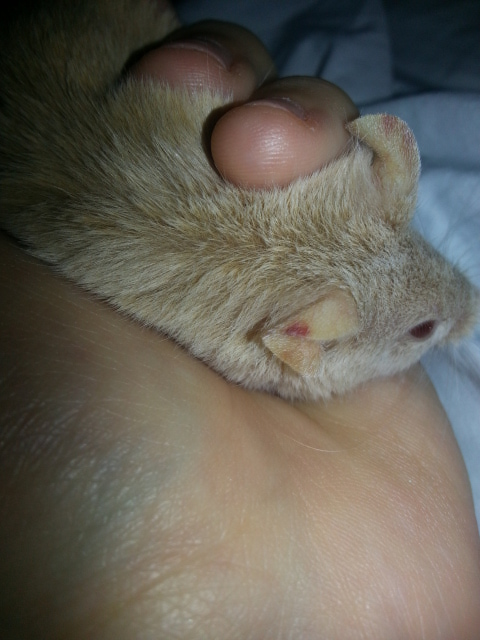 Red patches on mouse ears
Question
Dinah
Hi Natasha :)
I have eight femal
Red patches on mouse ears
Question
Dinah
Hi Natasha :)
I have eight femal
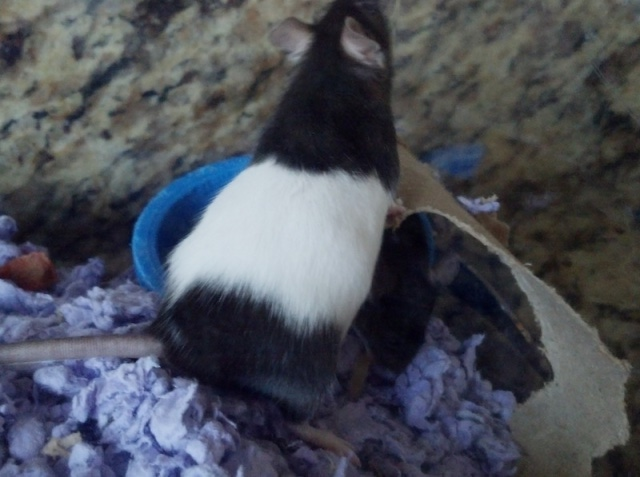 is my mouse pregnant and in labor?
Question
Momma Mouse Momma Mouse BIg Bottom
is my mouse pregnant and in labor?
Question
Momma Mouse Momma Mouse BIg Bottom
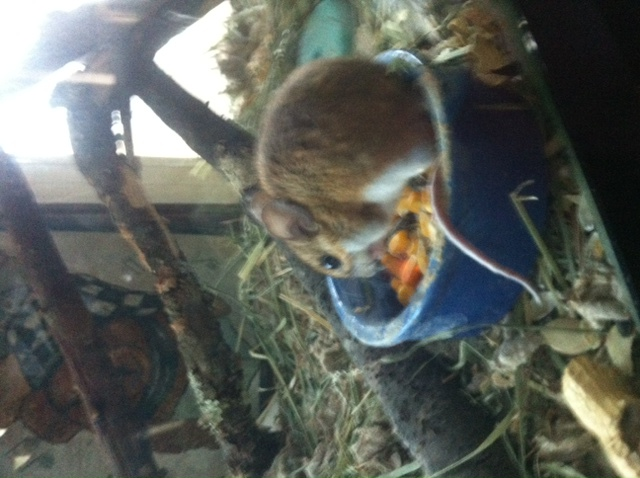 Fat Pet Field Mouse
QuestionReggie
QUESTION: Help!
&nb
Fat Pet Field Mouse
QuestionReggie
QUESTION: Help!
&nb
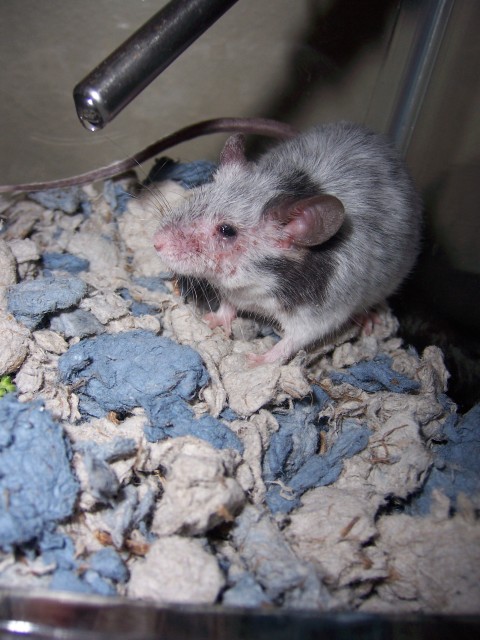 hair loss, red patches on mouses face
Question
male mouse
my male mouse is losing fur around
hair loss, red patches on mouses face
Question
male mouse
my male mouse is losing fur around